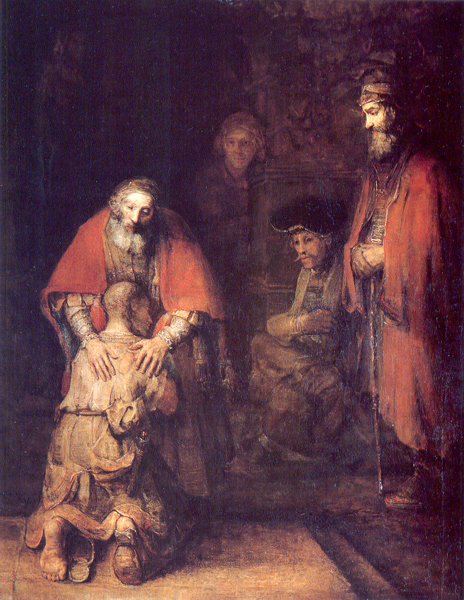This Sunday, the lectionary invites us to meditate on Luke 15:1-3 and 11b-32, the parable of the prodigal[1] son. The English Standard Version inserts three headings in the chapter: The Parable of the Lost Sheep, The Parable of the Lost Coin, and The Parable of the Prodigal Son.
Jesus told these parables in response to Pharisees and scribes who grumbled that “this man receives sinners and eats with them.” The three parables have the same theme, “lost and found.”
Recently, a father in my church died. He left behind a wife and four children. The oldest child is a son, nineteen years old.
Relatives and friends rallied to support the family. Everyone said the oldest son had to step up. Had to grow up real fast. Had to take charge.
The oldest son agreed.
He’s been much on my mind. Therefore, in reading the parable of the prodigal son, I’m eager to see what I can learn about the oldest son, the one of whom much is expected.
I know of two renditions of the prodigal son by the Dutch painter Rembrandt, who died aged 63-years, in 1669. In his first work, an etching, he seems to focus on the younger son and the father. In his second work, in colour, he seems to focus on the father and both sons.
Actually, in the second work, it’s hard to say what’s the focus. On the left, there’s the father and the prodigal son. Behind them, there’s a female figure. On the right, there’s the older son and another man. The father and the older son wear some clothing made of the same red material.
The story is easily told. The father is a wealthy landowner with many servants. And two sons. The younger son cares nothing for family and tradition. He demands his inheritance from his father. His father gives in. The son goes far away to a polluted land and squanders all his wealth.
One day, he comes to his senses. He recognizes the horror of what he’s done, the dishonourable way in which he’s treated his father and his traditions. Dressed in rags, he returns home, to confess his sin to his father, apologize, and plead for a job as a hired hand.
The father’s been longing for the son’s return. He’s been scanning the horizon every day since he left. The father runs out to him. Cuts short his apology. Tells his servants to put a fine robe, a ring and shoes on him. Tells them to kill the fattened calf and call everyone for a party.
The older son’s been out in the fields. Working. Sweating. Tired. He trudges home. Sees people moving about, to and from his house. Hears the sounds of laughter, joy. Wonders what’s going on. Asks a servant. Gets the news. His brother has returned. Dad wants to party.
The older son isn’t happy. He rails against his father. Says the father’s pouring care on the son who burned money. But never cared to give anything to him, the responsible son, so he could party with his mates.
The father pleads with him, says “you’re always with me, all I have is yours.” And adds that it’s “fitting to celebrate and be glad, for this your brother was dead, and is alive; he was lost, and is found.”
Rembrandt made his colour painting of the prodigal the year before he died. It was one of his last works. By that time, he’d experienced the deaths of four of his five children, and of his beloved first wife, Saskia. He’d also lost all his wealth. Due to prodigal living.
Perhaps in his younger days he would’ve seen himself in the younger son. And perhaps, in his final days he would’ve seen himself in the father.
But it’s important to note that the father wouldn’t qualify to be an elder in a church, because he doesn’t meet the criteria in Titus 1:6 that an elder’s children must not be “open to the charge of debauchery or insubordination.” The father fails the test, because of the younger son.
What of the oldest son?
He seems to be lost. It seems the father – whom Jesus uses to portray God – and the rest of the family – must now seek him and find him. And rejoice over him, just as they would after finding a lost sheep or coin.
The most ironic thing about the parable is that if a church was looking to appoint elders, the one most likely to be chosen is the oldest son.
Who am I like? Who are you like?
Peace be with you.
[1] Reckless, wasteful.
To learn more about Rama, click here.


